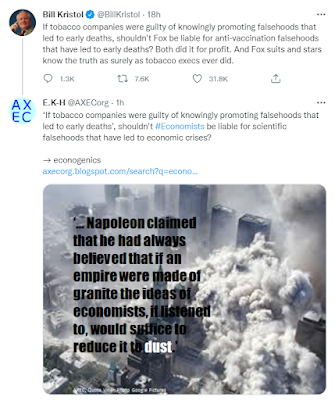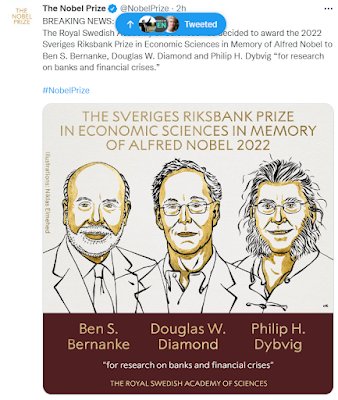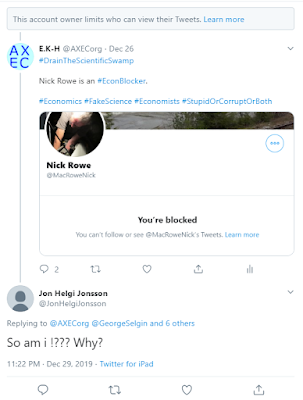Blog-Reference
Economists do not understand how the economy works. The deeper reason is that neither the Walrasian, nor the Keynesian, nor the Marxian, nor the Austrian sect understands what profit is. What the general public can see and touch and smell and feel is that the representative economist does not understand the pivotal phenomenon of his subject matter. Economists are like astronomers before gravity was properly understood.
Marx was, like the Classicals, a political economist and mainly concerned with society and the underlying laws/trends of societal evolution. As a matter of fact, he was rather good at descriptive sociology but completely failed as an economist. Like Smith, Ricardo, and other classical economists he got the profit theory wrong (2014a). And this fate Marxianism shares with the other sects until this very day: “A satisfactory theory of profits is still elusive.” (Desai, 2008, p. 10)
Because of this, the formula that David Ruccio presents as Marx’s theory of accumulation is simply false, while his observations about declining capital investment in the USA are spot on. As with most heterodox economists, the sociology is better than economics proper.
The axiomatically correct macroeconomic Profit Law for the 2-sector economy reads Qm ≡Yd+I−Sm (2014b, p. 8, eq. (18))#1 Legend: Qm monetary profit, Yd distributed profit, Sm monetary saving, I investment expenditure, dimension €, $, etc. per period
The Profit Law gets a bit more complex when foreign trade and government are included. By summing up investment expenditures over time and taking depreciation into account the equation ultimately yields the profit rate (2011, Sec. 6.2). These details are not needed at the moment. Nonmonetary profit Qn and nonmonetary saving Sn which relate to re-valuations are also left out of the picture.
The macroeconomic Profit Law says (for the world economy as a whole):
(i) strong growth = high investment I = accumulation is good for the overall monetary profit Qm of the business sector as a whole,
(ii) strong consumption expenditures = low monetary saving Sm or even dissaving −Sm = growing consumer debt is good for profit,
(iii) by implication high government deficit spending = growing public debt is good for profit,#2
(iv) substantial profit distribution Yd is good for profit.
Profit and profit distribution constitute a self-reinforcing feedback loop. The same holds for profit and investment. These built-in positive feedback loops explode the notion of equilibrium once and for all. The market economy is not a self-optimizing equilibrium system.
Note that overall profit has nothing to do with high productivity or low wages or the capital stock. These and other factors affect only the distribution of overall profit between firms or countries.
Note also that the Profit Law holds for the USA, Russia, China, the EU, and all other countries or associations, that is, it does not matter at all whether one has a pure/mixed market economy or private property or free enterprise or any other of the alleged characteristics of capitalism. The Profit Law holds for every national monetary economy and for the world economy as a whole.
In the last decades, overall (= world) profit has been driven by the growth in Asia (= high I), by dissaving, i.e. the growth of private debt mainly in the USA, by the growth of public debt worldwide, and by substantial profit distribution mainly in the USA. Overall profit has been redistributed between nations/regions via export surpluses/deficits.
Roughly speaking, as accumulation (= I) slows down in China/Asia and the developing regions world-profit goes down, then overall profit distribution goes down, then again profit goes down, then investment goes down, and so on. Rising unemployment and falling wages accelerate the downward spiral (2015). This spiral is deflationary no matter what the Fed or other central banks do.
So Marx got the life formula — accumulate, accumulate! — of the monetary economy almost right. He had, in any case, a better grasp of economic dynamics than standard equilibrium theory. Independently of all these differences between the major sects of economics the greatest collective scientific embarrassment of all times is: the profit theory is false since Adam Smith.
Egmont Kakarot-Handtke
References
Desai, M. (2008). Profit and Profit Theory. In S. N. Durlauf, and L. E. Blume (Eds.), The New Palgrave Dictionary of Economics Online, 1–11. Palgrave Macmillan, 2nd edition. URL
Kakarot-Handtke, E. (2011). Squaring the Investment Cycle. SSRN Working Paper Series, 1911796: 1–25. URL
Kakarot-Handtke, E. (2014a). Profit for Marxists. SSRN Working Paper Series, 2414301: 1–25. URL
Kakarot-Handtke, E. (2014b). The Three Fatal Mistakes of Yesterday Economics: Profit, I=S, Employment. SSRN Working Paper Series, 2489792: 1–13. URL
Kakarot-Handtke, E. (2015). Major Defects of the Market Economy. SSRN Working Paper Series, 2624350: 1–40. URL
#1 For the rising complexity of the Profit Law see Wikimedia AXEC143d.
#2 Keynesianism as ultimate profit machine
Related 'Rethinking the Profit Law' and 'The perennial conundrum: profit and distribution' and 'Ricardo, too, got profit theory wrong!' and 'The Common Error of Common Sense: An Essential Rectification of the Accounting Approach' and 'Profit'. For details of the big picture see cross-references Profit.












